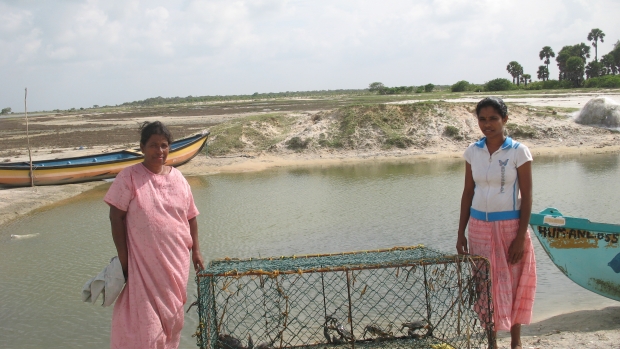Grants :: Small Grant Facilities :: Preserving Puttalam lagoon for future generations
Preserving Puttalam lagoon for future generations

Crab cages Puttalam , Sri Lanka © KEkaratne, 2009
Objectives
The primary objective of this project was to protect and manage the natural resources of Puttalam lagoon, on which fishing communities have long depended and continue to depend.
Background
This project was implemented in the multi-ethnic fishing village of Ammathottam. A local community-based organisation, PEARLS (Peaceful Environment Assured Right Lasting Solutions), and the Ammathottam Janahanda Fishing Women’s Guild worked together to protect the environment and resources of Puttalam lagoon and the Ammathottam shoreline. The project partners aimed to achieve this goal through awareness programmes, replanting of mangroves, home gardening, providing clay stoves to reduce firewood use, and raising incomes through activities such as goat farming and crab fattening.
Target beneficiaries
Families in Ammathottam fishing village.
Outputs
- Delivery of awareness programmes and workshops.
- Provision of training in developing home gardens.
- Creation of 15 home gardens.
- Planting of 4,000 Rhizophora seedlings.
- Installation of 40 clay stoves to reduce consumption of mangrove wood.
- Provision of cages for crab fattening to three villagers.
- Adoption of goat rearing by nine widows
Accomplishments and challenges
The two main achievements of the project were increased local awareness of the environment and ecosystems of Puttalam lagoon, and increased income-generating opportunities.
In practical terms, 4,000 Rhizophora seedlings were successfully established. Clay stoves were enthusiastically adopted by 40 women, and 41 families were given 260 coconut seedlings and seeds for nine varieties of vegetables to cultivate in their home gardens. These have provided vegetables for home consumption and sale, increasing household income. Three villagers were provided with crab cages and trained in using them.
Challenges
One drawback was that some fishermen did not help to protect the newly planted mangroves because they were ignorant of their value. These fishermen have continued to cut down mangroves for construction materials, firewood and other purposes.
Contributions to cross-cutting themes
Gender equality
Women, especially widows, were given an opportunity to earn extra income from home gardening and goat rearing.
Lessons Learned
Training and awareness programmes proved vital as the local fishing community knew little about environmental values and threats.
Putting soft-shelled crabs in cages gave them enough time to harden their shells, thus increasing their market value. Good security measures are essential for crab-fattening activities, however.
Families took to the clay stoves once they realised they are cheaper, easier and quicker to use for cooking. This helped to reduce the demand for mangrove wood as fuel for cooking. The planting of fast-growing tree species such as Portia spp. also helped to reduce mangrove cutting, while also providing fodder for livestock.
Project Facts
Country
Location
Puttalam, Sri Lanka
Topic
Duration
1st Feb 2009 to 30th Nov 2009
MFF Grant Amount
US$3,882
Implementing Partner
Peaceful Environment Assured Right Lasting Solutions (PEARLS)
Kalpitiya Road, Pallivasalthurai,
Puttalam, Sri Lanka
Tel: +94 71 9203154
